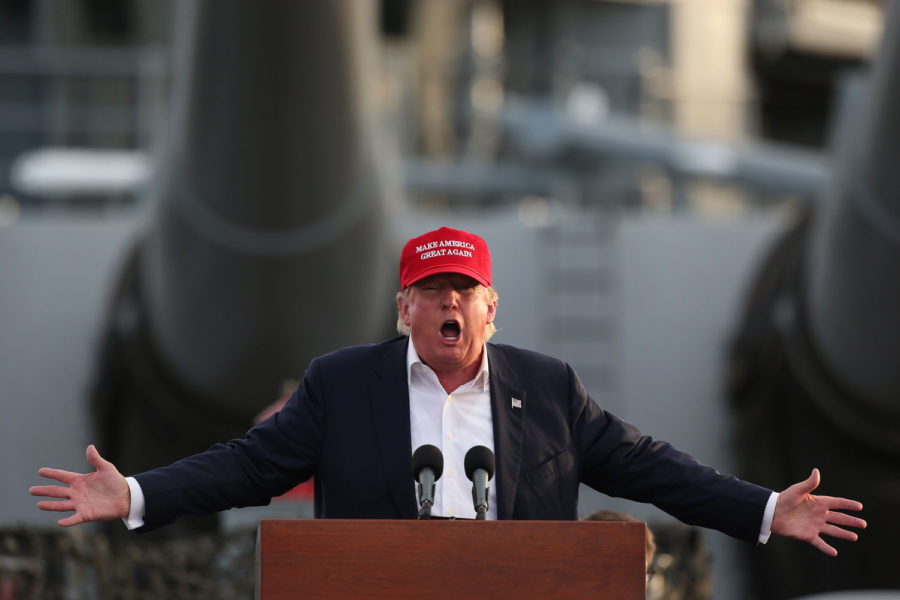Q&A: How Senate Republican campaigns will handle Trump
President-elect Donald Trump speaks to supporters aboard the USS Iowa battleship in Los Angeles on Sept. 15. (Robert Gauthier/Los Angeles Times/TNS)
May 4, 2016
Donald Trump is, for all intents and purposes, the presumptive GOP presidential nominee. And his ascent to the top of his party’s ticket carries big consequences for down-ballot Republicans.
Here is the compilation of three months of reporting about Senate Republicans preparing for a Trump nomination:
Q: How bad is the outlook for Senate Republicans?
Advertisement
A: Pretty bad, according to many of the party’s own strategists.
Republicans can afford to lose only a net of three Senate seats to hold their majority, and the party is already defending seven states — Illinois, Wisconsin, Ohio, Pennsylvania, New Hampshire, Florida and Iowa — that President Barack Obama won twice.
With Trump, though, many Republicans become despondent. One Senate campaign veteran last month estimated that the party had a 75 percent chance of losing the majority. Another put the odds at 80 percent.
MORE: Here’s where the candidates stand on the issues
“I’m not saying people cannot win with him at top of the ticket, but remember how challenging Todd Akin was? That would look like child’s play compared to what we’re about to deal with with Trump,” Rob Jesmer, the former executive director of the National Republican Senatorial Committee, said in early March. Akin was the failed 2012 Missouri Senate Republican candidate of “legitimate rape” infamy.
Q: What has the party been doing to prepare for Trump?
It’s not as if Senate GOP officials have been caught unprepared.
Advertisement*
The NRSC wrote a widely read memo detailing a possible game plan with Trump last fall, and the committee has been meeting almost weekly since March of last year to discuss different presidential-race scenarios. Ward Baker, the group’s executive director, is said to have been convinced far longer than most party officials that Trump could actually win the party’s presidential nomination.
But many of the men and women running Republican Senate races are still uncertain about what to expect from the unpredictable Trump. They don’t know, for example, if he plans to build a ground-game in battleground states or share voter data.
They also don’t know if he’ll even support all of the party’s incumbents or nominees — Sen. Pat Toomey of Pennsylvania, for instance, endorsed Sen. Marco Rubio in February and said he voted for Sen. Ted Cruz in April. Will the boisterous Trump, known for holding grudges, tell his supporters not to back the first-term incumbent?
Q: What’s the hardest question they’ll have to answer about Trump?
A: Above all, the Republican Senate candidates must determine whether they will vote for Trump in the fall.
This is a tricky question for the party, because it puts the GOP candidates between Trump’s loyal base of supporters and the moderates who are repelled by him. The Republican candidates need both kinds of voters to win in November. Many Republicans incumbents have already said they will back the eventual GOP nominee, but there is a strong belief in the party that they can re-open that discussion now that Trump is the presumptive nominee.
Q: Do Republicans know if their candidates should say they back Trump?
A: No. Like many things pertaining to the New York billionaire, most candidates and their advisers aren’t quite sure what to do just yet. In March, Jesmer suggested they have until July’s Republican National Convention in Cleveland to make up their minds.
Q: So are Senate Republicans throwing in the towel?
A: No, not at all. The party has a strategy in mind that depends on 18 months of preparation and truckloads of money.
Basically, Senate Republicans are banking on running great campaigns that — with the help of ever-more-sophisticated campaign technology — can target specific voter blocs on key issues. In Ohio, for instance, Sen. Rob Portman’s campaign hopes to use the Iranian nuclear arms deal to persuade tens of thousands of Democrats to back the incumbent Republican’s campaign.
It helps that many Republican-aligned outside groups have signaled they might refocus their spending on Senate races, as The Washington Post reported in March.
The campaigns also want to keep the races as focused on local issues as possible, hopeful to avoid a potential anti-Trump national wave.
“We’re going to run these campaigns for Senate like they’re running for sheriff,” said Scott Reed, a strategist for the Chamber and campaign manager for Bob Dole’s 1996 presidential campaign. “Local, local, local.”
Q: Is that doable?
A: It is, but it’s hard. As Ron Brownstein of The Atlantic has chronicled, ticket-splitters between the presidential and Senate races are increasingly rare. In presidential election years, these down-ballot affairs have become little more than mirrors of the top-of-the-ticket race.
That means if Trump loses New Hampshire by 10 points, it’s going to make life hard for Kelly Ayotte, the incumbent Republican senator there. Usually, candidates in competitive races struggle to over-perform their presidential nominee by more than a few points.
Q: So why would this year be different?
A: Say this for the Trump: He’s unconventional. And the GOP candidates are banking the public knows it, too, giving them greater leeway to separate from the top of the ticket than they would with a more traditional nominee.
Republicans are also banking on Hillary Clinton’s own unpopularity. Her deep disapproval gives the GOP an opening to argue that, even if voters don’t want Trump in the White House, they don’t want to give Clinton unified control of Congress, either.
This argument, more than any other, is what gives even the party’s most pessimistic strategists hope they can salvage 2016.
Q: What do Democrats think?
A: That the GOP is fooling itself, not unlike how their own party did in 2014 when a national anti-Democratic wave swept incumbents out office in the midterm elections. Along with the Supreme Court vacancy, Senate Democrats have focused almost all of their energy on linking Republican candidates to Trump. Their bet is the presumptive GOP nominee is so unpopular that no amount of distancing other Republicans will let them escape the Trump-focused voter backlash.
Q: So Democrats are confident?
A: Very. Enough that party operatives have an eye on second-tier opportunities in places like North Carolina, Missouri, Arizona, and even Indiana and Kentucky. If things continue to go their way over the summer, expect open talk about building a Senate majority that can insulate the party from losses in 2018, when a host of vulnerable Democratic incumbents in red states are up for re-election.
Q: So the GOP is convinced that Trump will be a disaster?
A: Well, no. Many in the party are convinced he will be. But there are notable exceptions, and they include key strategists working important Senate races.
Brad Todd, a GOP Senate campaign guru, said in an interview this week that Trump can still be a decent candidate in the fall because Clinton is such a weak one herself. If Trump can unite all parts of the GOP coalition — a big if, he conceded — his appeal to blue-collar voters could make him a stronger nominee than someone like Mitt Romney.
“The kind of voters most enthusiastic about Trump is a voter who normally votes Republican but couldn’t stomach Mitt Romney,” he said.
___
(c)2016 CQ-Roll Call, Inc., All Rights Reserved
Visit CQ Roll Call at www.rollcall.com
Distributed by Tribune Content Agency, LLC.
Advertisement










